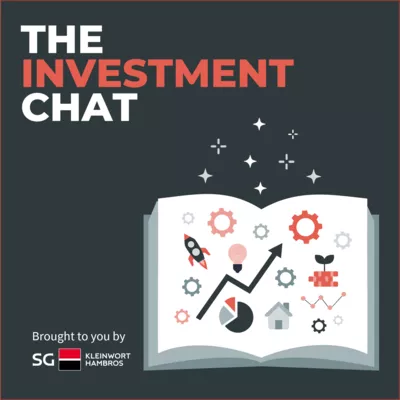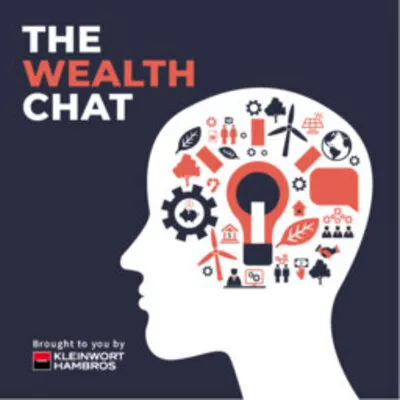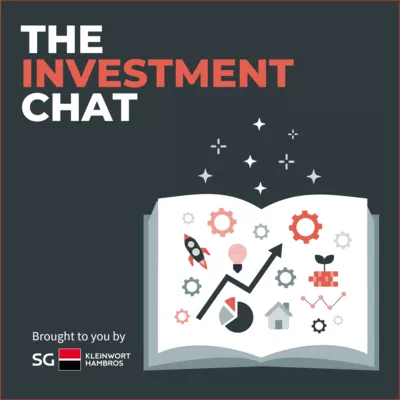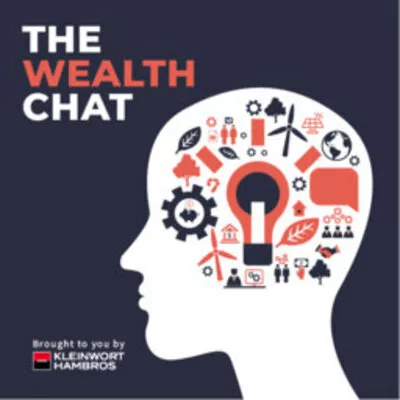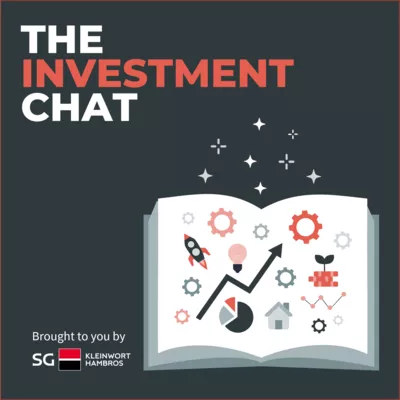
FEMALE ENTREPRENEURS, Lead Like a Woman with RAWtalks academy
Description
The Entrepreneurs' Chat
RAWtalks Academy
00:00:04
James Hurley: Hello and a big welcome to this, the last episode in this series of The Entrepreneurs' Chat, a podcast brought to you by Kleinwort Hambros. I'm your host, James Hurley, assistant business editor at The Times. From startup to sale, and all the nitty gritty in between, the course of building a business is never straightforward. So in this series, we've been going behind the scenes exploring the highs and lows that come with growing a company. Today I'm joined by Tamsin Napier- Munn, founder of RAWtalks academy.
00:00:31
Tamsin Napier-Munn: If you want to be an entrepreneur, if you want to get ahead, you have to step out of your comfort zone. And I cite this to a lot of people and say, " Comfort zone is a wonderful place to be, but nothing grows there, so you just have to find the courage."
00:00:45
James Hurley: So far, we've heard stories of five different entrepreneurs on what it takes to build a successful business. In this, the last episode of the series, we've got something a little different. I'm joined by Tamsin, founder of RAWtalks academy, who worked with female entrepreneurs and business women to build up their confidence, reach their potential, and in her words, to beat anxiety and procrastination. Tamsin spent 25 years in sales in what she calls an unpredictable and totally unplanned career in fashion, IT consulting, publishing and training before she launched RAWtalks academy in 2019. The company helps women in business achieve their goals through programs and masterclasses, which help them, in her words, get seen, get heard, and get ahead. Now, Tamsin, you've had a very varied career, and as you call it, totally unplanned. In that context, can you explain how RAWtalks academy came about?
00:01:37
Tamsin Napier-Munn: So I had a very, I suppose, a troubled childhood that kind of gave me quite a lot of drive, and part of that drive was to become very independent. And so when I left school and I didn't go to university, but I just set out to find my fame and fortune in London. I decided I wanted to go into fashion because that's always been my thing. So I fell into, literally fell into fashion one day in the West End, knocking on a door, and this guy opened the door of a wholesaler and said, " Come in." And we started chatting and I then started working literally as a gopher, 50 quid a week, just helping out. And then I worked for Philip Green for a while, and he once turned to me and said, " Tamsin, if you had brains, you'd be dangerous." And I remember thinking at the time, I'm not sure if that was a compliment, and it kind of was one of those I'll show you moments where you think, " Right, sod it. I'm off. I'm going to try and make..."
It was always about proving something to myself. I had lack of confidence and I was never allowed to speak at home. I was never allowed to express myself. So this was a kind of wearing lots of masks and I found myself in a situation where I was selling. I think they should study this at university because it's the best paid career you could ever get into and you could turn it to anything. So I started selling in fashion. I worked for my cousins, literally with samples in the back going around to shops all over the country, selling shoes. And I then went into publishing and I was only about 22, 23. And it was literally those days when you could smoke in an office. It was just full of these guys all with phones, just with the actual mouthpiece, just talking into it, not even listening.
And they were selling, literally hard sell. And I sort of had to find my way. I was probably the only female in the room. And that kind of taught me quite a lot of lessons, but I didn't let it bother me. And I have to say, being in sales, I went into IT. I was headhunted to go into it. I have no idea because I am not technical at all. But one thing I did realize I could do was build relationships with people. And if you can do that, you can really influence anyone. So I started to understand that I could wear all these masks, James, I was wearing a lot of masks to hide my insecurities, and in those days you had the padded shoulders, the glasses. I actually went and got glasses with just glasses in it from the opticians. They thought I was mad.
I'm sure I'm not the only one who's done that just to look intelligent because I was a woman in a man's world and most of my clients were men. So to where I was in working in IT, consulting and training, it was in the early nineties, walking into organizations, corporates, banks in the city, selling training, selling software. And I have to say that it never really occurred to me that being a woman held me back because I perhaps used it to enhance my selling techniques, if you like. Which again, right or wrong, it worked. So I kind of did really well. I was flying high, going backwards and forwards to New York, but I was chasing this almighty dollar, chasing this kind of trying to be financially independent, but I wasn't really enjoying what I was doing. I wasn't following a passion. And it came to the dot- com boom time.
And I remember this guy in one of the organizations that I worked for, we were asked who wanted to pitch for this piece of business and he immediately put his hand up and I hesitated, and I tell the story a lot to people because it was the first indication for me that there was something holding me back. That hesitation cost me literally tens of thousands of pounds a month in commission because I hesitated just for a few minutes just because the self- doubts came rushing in and hijacked my brain. And he got the deal and I remember thinking, " I'm just never going to hold myself back. I'm going to put myself forward for things and not hesitate, stop overthinking." And so fast- forward when the dot- com boom time burst, I thought, "You know what? I need to change direction." Dale Carnegie has been a great influence in my life.
So I went on a course in 1988. It changed my life. It helped me to unleash my self- expression for the first time someone believed in me, the coach at the time. So having had that experience and my career had just flown, I decided to go knocking on their door saying, " Look, teach me how to be a coach, how to do what you do and I'll sell for you." So they set me up in Windsor. We set up the Windsor office. Dale Carnegie is about public speaking and public speaking, as he said at the time, Dale Carnegie is the foundation or how to build confidence. So I started doing talks, and I have to be honest, it's the most excruciating thing to do for me is to stand in front of an audience. It still is. But because of a childhood where I was... I was not allowed to talk up. Those triggers came back every time I stood up.
But it was that sort of one thing that decided I'm going to just motor through. I've got to face this if I want to get my message across, my story. So this is where I suppose RAWtalks was born, but it didn't really manifest itself until later on I got pregnant. I brought my son up pretty much on my own right from the start for the first four years of his life. And I learned to juggle, I learned the flexibility, but I learned that you just get on with it sometimes if you have no choice. I think my mother taught me this kind of wartime grit, a stiff upper lip, just grin and bear it. But actually, there was a downside to that is that you can stop connecting with yourself and feeling those feelings of fear. You just get on with it.
So it got me to a certain point, and then when I got divorced and I was going through menopause, I didn't know whether it was the menopause, the divorce, or my history of anxiety and fear, but I had what is commonly known as a nervous breakdown. And that floored me. I mean, I literally was on my knees and it took me some time to pick myself up. But I used that hesitation, that moment of hesitation when you overthink and life gets overwhelming, I took that experience that I'd had years before and I pushed myself and I literally got up one day and picked up the phone to David Murray who ran The Business Magazine in the Thames Valley in the south. And I'd been watching them for a long time seeing they did a lot of events, awards, and I thought maybe one day I could just be on stage.
I could start really building my confidence through public speaking and really develop that as a career. And I had no idea what I was going to do for him. He hadn't got a job open. But I think the years of learning to know how to influence people to sell yourself, because this is something that a lot of women I know don't particularly feel comfortable doing is he found me a role. I was on contract and he immediately turned and said, " Here, we're starting a Women in Business awards and a program. Why don't you run with that?" And I'll be honest with you, it was the last thing I wanted to do because actually Women in Business was something I didn't ... I envisaged sort of women who lunch, ladies who lunch, that kind of thing. But I kind of took it on. Six months later I was on stage presenting and hosting the first awards that I'd ever done.
It was nerve wracking. It was probably the scariest thing I'd ever done. But I sort of faced the fear, got through it. And part of what I do with RAWtalks academy is one of the reasons why I started it is because I saw so many women, I meet so many women from the executive level through to those people starting out in their career just fearful of getting out of their comfort zone and holding themselves back. So you have to, if you want to be an entrepreneur, if you want to get ahead, you have to step out of your comfort zone. And I cite this to a lot of people and say, " Comfort zone is a wonderful place to be, but nothing grows there, so you just have to find the courage." So I then continue to build that, and I took on the Entrepreneurs Campaign as well, hosting those and getting speakers in, and I really found my feet.
I then started to meet some of the most awesome women I've ever met. I realized that I was wrong, that actually as a woman, there's so much that's holding us back, so many things that we talk ourselves out of, we hesitate, we overthink, we think things through differently. And I then left the magazine in 2019 to set up RAWtalks academy, for that reason, it stands for Real Authentic Women, but essentially it's about how we connect and find our voice and speak our truth. How do we overcome these issues? Now, I came up with strategies that I'd used myself and I started teaching them.
00:11:59
James Hurley: Yeah, well, that was probably the most comprehensive answer I've had to the backstory, Tams. That was fantastic. Thank you so much, and for your honesty about the personal side of how the business came about. I wondered if you could tell us in a nutshell what, I suppose, success looks like for you in terms of how someone comes into one of your programs or masterclasses and then what they look like when they leave and what they leave with.
00:12:23
Tamsin Napier-Munn: Okay, so I did start running courses, which I had some amazing women who were also looking to run their own businesses. And what they came away with they said was confidence, the courage and the ability to be able to communicate with confidence and clarity, to be able to take the hand break off their lives and off the opportunities that they knew they had this sort of passion around, but they'd linked it then with a purpose. So we talked about purpose, we talked about how to recognize the strengths in ourselves because so many women underplay themselves, we undervalue, underplay, we under- promote. So they had come out of these masterclasses with a voice, with confidence, with courage. So that was, James, in the 2019 to 2020. And when lockdown happened, we all had to pivot and I ran them online, which is something, again, the biggest challenge I think most people who've never done that before can face to how to market yourself.
All the challenges that everybody faced pivoting their businesses. And I ran a couple of programs on that basis, but I realized that actually, and think this is something that every entrepreneur needs to know when they start their own business, is to know when to stop flogging a dead horse, determination, persistence is one thing, but it's knowing when to let go and when to, like a ship I suppose, if you've got a rudders to navigate your way, you just have to shift your direction. And I was so determined to get these programs going and to do the sort of Mel Robbins, the Anthony Robbins thing of one to many, but that takes a massive great marketing machine, which you'd invest a lot of money in. And quite frankly, I wasn't sure that that was the direction I was going in.
So I learned to let go. And what I've been doing since is some corporate work, a lot of corporate work because that's my background working for corporates and helping them with their gender equality forums and their programs and coaching senior women as well. And so where I see, probably one of the most important things that the company's come out of this is with a different way of thinking and different way of approaching how to unleash potential of women. But probably the most important thing that has to get across, people talk about empowering women, but actually it's not about empowering women. That's a given. It's saying women have to empower themselves. We have to take charge of our confidence, our skills, our abilities, and our future and our careers. So I challenge women in these organizations to stop waiting to be asked for promotion or to be asked their opinion. And we look at strategies and skills, and a lot of it's around public speaking, James, because that's where a lot of confidence starts.
So running masterclasses for organizations for their, I suppose, the ones to watch, that female talent that they want to see who are aspirational. So that's one set of things. And then looking at working with companies now at how they are connecting with and engaging with their female talent. How are they, particularly male dominated worlds such as finance, where we're stepping into or this perception of we're stepping into a man's world. I know this, a lot of it is a mindset. I know there are things that companies can change, but my job is in a way to disrupt women's thinking, leaders' thinking, challenge that mindset, and then inspire that change to take a shift, a different perception and perspective. So instead of saying we're stepping into a man's world, what if it's a shared world? And I'm working on some models around what does the shared world look like and helping to shift the cultures with organizations. We are not tapping into the talent that's already there, let alone attracting women into the organization.
00:16:56
James Hurley: I was just going to say, I mean, it must be interesting to see the differences between the organizations you work with in terms of how they encourage gender diversity. We have seen some progress on this issue in recent years. I think for the first time we've got the proportion of women in board roles above 40%, for example. I wonder if you could give us some insight on what you see companies getting right. Obviously there's still a lot that needs to be done and some companies are still getting things wrong, but are there any of your clients that you see doing interesting things to tackle gender diversity that you think other employers could adopt?
00:17:31
Tamsin Napier-Munn: Yeah, I think there's quite a few things, but one major thing that I see, and particularly now is ... Two things. One is rather than this gender equality that has been driven so hard in years gone by, it's about gender equity and equity is about meeting people at their needs, men and women. So looking at what people need to give them that opportunity to be equal. So it is taking a different focus, and that helps to sort of break down, I think, the barriers that this whole gender equality can do, which is marginalizing a lot of men. And I think one of the first important things in which I'm working with Kleinwort Hambros, for example, is in looking at how to get that balance, how to ensure that we connect. So one of the biggest things that needs to happen if you want to get inclusivity, and this is something I'm working on a new program for working with organizations, is connection.
If you want to get inclusivity, it takes real connection between people. When people connect, they respect and understand and acknowledge the differences, and that brings people together as opposed to drive a wedge between the two.
00:18:53
James Hurley: Yeah, that very much makes sense. I also wondered if there's anything that you've taken from your career, which you've described as very unpredictable, and I think you've used the phrase totally unplanned as well. Are there things that you've taken from that that you're now advising women in these companies in terms of whether things you got right, but also pitfalls to avoid?
00:19:12
Tamsin Napier-Munn: Yeah, I'd say there's this whole thing about saying yes to things instead of saying no, but I also think it's important for women to be able to say no to things that means that they don't cross a boundary for themselves or don't compromise themselves because we're so often, I always say tend to and often because there are obviously women who don't feel like this and don't behave like this, but a lot of women who are aspirational, they're grateful. I remember a partner in a law firm saying to me, once, " Tamsin, when I offer a guy a promotion, he negotiates. But a woman will thank me." So there's a sort of difference in how women see themselves. The lessons really I've seen that need to be learned by a lot of women and a lot of men is that it's about connection.
It's also about women taking charge, speaking up, asking for what they want. But I also think organizations need to recognize that men take a different path often to success. Success may mean a language of ambition, targets, goals, getting to the title, getting to the position that they want, whereas women often navigate their way differently. They're looking to fulfill their potential or realize their talents or prove themselves in some way. So there's a different pathway. And I think recognizing that's important, we don't have to be the same. Also, I think women like to connect with each other, and I think it's so important for women to recognize you're not alone is to reach out for mentors, reach out for other women and get advice, play to your strengths.
And I think of you're an entrepreneur as well. One of the things I've learned is trying to do it all. As women, often we feel, some women, feel we have to do it all, especially if we have a family. But just focus on your strengths and play to them. It's important, if you want to get ahead, to get seen and to get heard in that you need to get a voice, you need to be heard. You need to master the art of being able to inspire others, to be able to influence others, and to be able to impact change. And those are the three pillars, if you like, that I work on with people, women particularly.
00:21:38
James Hurley: And why do you think there are those differences there that you've described? So for example, you talked there about the differences in how sometimes women and male colleagues will react to a promotion. Why do you think that happens? I mean, is that a result of women reacting to institutionalized sexism or do you just think that there's innate differences in how different genders approach things in the workplace?
00:22:02
Tamsin Napier-Munn: Yeah, it's an interesting question, James, and one that I don't have the full answer to. I think I can sort of give you my thoughts on it. I think there's some science obviously around the differences, how women think, our brains function differently, whether that's through nature or nurture, evolution, I don't know. But there's a book called The Female Brain, which is a really good book to read to understand how women think differently. So we approach things often differently. Now, I'm not saying everybody does, but the large majority, the vast majority of women at a leadership level, you look at leading like a woman, women can bring often compassion. I'm not saying men don't, but more compassion, creativity, a different perspective on things. So I think if we can recognize that and organizations could acknowledge that, we then stop having to feel like we have to step into these men's shoes.
So of course there are lots of organizations that are startups, a lot of modernized and proactive and progressive organizations that have really got the cultures right from the start. But when we're talking about a lot of historic legacy organizations from years gone by like finance, like lawyers, et cetera, there's a deep set culture, which is incredibly hard to dig out. You kind of have to do an extra sketcher and a paradigm shift to just look at what a man's or woman's world is ... Get the leadership round a table and look at what a shared world will look like and then recruit behaviors around that. I think it's awareness as well, awareness of how a culture from the top can filter through. So we've come a long way, but I think a lot of it is down to how women can take charge and influence the future, the landscape themselves, without waiting for others to change it.
00:24:04
James Hurley: That makes sense. I mean, would you say that also men have a responsibility here too? I mean, you work with lots of women entrepreneurs, don't you, and certainly have done through RAWtalks. And if they want to raise investment via venture capital, if you look at the amount of venture capital that goes into female led businesses, it's still shamefully low really. And to what extent can a female entrepreneur change that if the cards are so heavily stacked against them? Yeah, I suppose what I'm getting at is do you still think that there's a lot of cultural change that needs to happen besides the kind of things and skills that you can teach your clients?
00:24:40
Tamsin Napier-Munn: Yeah, there is, but your question is where does that come from? Who's going to drive that change? Getting allies with men, men on board with the conversation in a way that includes them, helps them to understand. And it's all about listening to each other, James, at a senior level within organizations, getting people to listen to each other is one thing, getting allies. So a lot around allyship of our male colleagues, of male business owners who we can get on board is one thing. The other is, I think, for women to be better at selling themselves. You're right, funds for female led businesses is woefully low, but a lot of it's because of male led venture capitalist companies leading these financial institutions. So we have to get their buy- in. We have to help them shift without beating them over the head. It's about getting buy- in. And so we have to sell ourselves a little bit more than perhaps we used to or we should do.
So getting good at self- promotion, and particularly female entrepreneurs need to know how to pitch. I know that a lot of women that I meet who are very successful entrepreneurs, they're really good at selling their passion, and part of this is about knowing what your passion is and being able to express it, sell it. And a lot of women hold themselves back, even those with the best ideas in the world because they just don't want to be vulnerable or put themselves forward. For me now, it's about how do we connect with each other, truly understand what each other has to offer. It is like a marriage, it's like a relationship. I think since the time began, men and women have gone, " But she doesn't understand me," or " He doesn't understand me." So this isn't something that's a modern thing, but if we want to have a real balance in the world of business and really have an impact, we need to inspire men and women to come together and to learn to listen to each other better.
00:26:58
James Hurley: I wondered if you could give me a real life classic example of a before and after, I suppose, of a client story, someone who came in to see you perhaps needed some more confidence and left and was able to put what they learned into practice with some impressive results.
00:27:13
Tamsin Napier-Munn: A woman who ran her own film production company came on my program originally, and she was one of, I don't know, 11, 12 other business owners. And she walked away having set up a new business, which she said she'd never have done before. So part of it was about getting new business. I've got various people, men and women actually I've worked with at a one- to- one coaching level who have gone on to talk in front of thousands of people who wouldn't otherwise have done. Sometimes what I've been able to do is instill belief because what I trust is my insights in people. I trust those instincts that I see things. And sometimes you need someone to believe in you before you believe in yourself. And that happened to me with my mental when I got on stage for the first time. Oh, yeah, I did a talk, for example, the other day for International Women's Day.
I went and gave this talk around cracking the confidence code, which involved as a friend of mine, a close male friend said to me, " Tamsin, what men have more of is a sod it button." And I've taken that and I've coined that phrase as part of a strategy and a technique I share with women, which is don't hesitate, you literally count backwards 3, 2, 1, and you move. So it's a bit more complex than that, but very simple in a way. And I taught this and I had two or three people follow up with me afterwards and said because of that one thing, they didn't hesitate. One of the ladies there got a promotion the next day.
00:28:57
James Hurley: And I also wanted to ask you about the breakdown that you've mentioned, and thank you for your honesty on that. You've spoken about that publicly before, haven't you? I wondered if the skills that you learned to get through that difficult period, does that often form part of the advice that you're giving to clients? And if so, I just wondered if you could illustrate that a little bit.
00:29:15
Tamsin Napier-Munn: Yeah. Resilience isn't something that you choose. It often comes from things that happen to you in life, but it's taught me is that we all have much more strength in us than we can possibly imagine. And getting out of your comfort zone and stepping out in spite of what you're going through, taking action is probably the biggest cure for fear and for anxiety. There are a couple of techniques that I've used, James, that I've taught because of my experience. One was the sod it button. Because if you go through a mental breakdown of some sort or another, which so many people go through, you become paralyzed. It feels like you're paralyzed and you can't move, you can't function. So when I use this technique to literally launch myself out of my chair, I didn't live in my head. " You have a beautiful mind, but you mustn't live there," I say to people. We have to literally get out of our heads into action. So this particular technique saved my life.
It literally took me from breakdown to breakthrough. When I got out of that chair, I launched myself into physical action and picked up the phone. That's one. When you move, it helps to kind of unleash some of the anxiety. You can diffuse it, and if you keep moving, you keep moving forward physically, it somehow breaks that paralysis. And the other thing I coined was mind judo. Now, I used this because it's a similar technique. When you're going through any mental crisis where you're overthinking and you go down a rabbit hole or rabbit warren even of anxiety and catastrophizing, and I know a lot of women and men maybe, but a lot of women catastrophize everything. Waking up at three o'clock in the morning and the world's falling in on you, and we go down this rabbit hole of everything's a disaster. And I use it as a technique for literally flipping your what ifs. So if you've got a bad case of the what ifs, you can literally what if up instead of what if down.
And I literally use this 3, 2, 1 technique to say, if I'm thinking or what if my son is in real danger because I can't get hold of him, I can go down an awful path. And I think a lot of mothers can do that. But if I think 3, 2, 1, what if he's fine? What if he's fine? Then your mindset follows. The same as if you're picking up the phone and thinking, what if I don't get this promotion? What if I don't get this deal? But what if you do? What if I do? And it can release that mind from being paralyzed and unhealthy into literally flipping it like a judo match. Men have the sod it button, but they also do have the imposter syndrome as well as women, but they don't allow it to hold them back as much as women allow it to hold them back. They have this sod it button and we've got to learn to ignore those doubts, those self- doubts, trust our instincts more and act on them.
00:32:41
James Hurley: I must say, I think I could do with taking on some of your tips though, Tams, perhaps it's a sort of difference between alpha males and beta males perhaps, who knows. Just then a final question for you, Tamsin, you like to tell your clients that they're stronger and more capable than they think they are, as you've mentioned. Can you give us one more thing that perhaps we can all take away and do to improve our confidence?
00:33:06
Tamsin Napier-Munn: I think probably one of the most important things I would say is anchor your career and your business with purpose because purpose drives your passion. And when you have passion and purpose, you'll not let anything really stop you. And by doing that, you will also inspire others, because after all, inspiration is probably one of the most important things, if not the most important things that we can do to impact the world beyond us. And inspiration is a feeling, it's an emotion. I think it's probably one of the most important things as a leader, as a business owner, you've got to learn to not just inspire others, but the first person that you need to inspire is yourself. So you have to become your own inspiration. And you can only do that by getting out of your comfort zone, taking action towards something that is meaningful and purposeful for yourself. And in doing so, you will inspire others.
00:34:10
James Hurley: Tamsin, thank you for sharing those tips on building confidence and getting ahead. Speaking of which, that's it for this series of The Entrepreneurs' Chat. If you've only recently joined us, remember you can scroll back in your podcast feed to hear words of wisdom from lots of brilliant entrepreneurs, from Joanna Jensen of skincare brand Childs Farm, to Matt Grech- Smith, the co- founder of Swingers, The Crazy Golf Company. While you're there, click the follow button so you're notified as soon as we're back. Until then, goodbye.
00:34:38
Speaker 3: Does running a business leave little time for managing your personal financial affairs? Kleinwort Hambros, we know how to simplify life's financial challenges for entrepreneurs. Considering your personal and business ambitions, we partner with you at every stage of your life, taking care of your finances so you can focus on what matters most to you. Find out more about how we can help create a secure financial future for you and your family at kleinworthambros. com.
Ask us your questions
Contact usLatest podcasts
